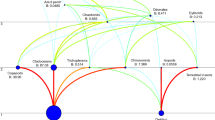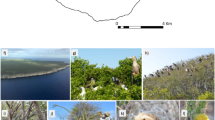Abstract
Litter processing by macroinvertebrates typically involves suites of species that act together to determine rates of breakdown and decomposition. However, tropical oceanic islands and coastal fringes on continents are often dominated by one or a few species of omnivorous land crabs that consume leaf litter. We used an exclusion experiment, together with other leaf removal and litter decomposition studies, to assess the role of a single dominant species, the red crab (Gecarcoidea natalis), in litter dynamics in rain forest on Christmas Island, Indian Ocean. In the presence of red crabs, litter cover and biomass varied seasonally, from almost complete cover and high biomass at the end of the dry season to almost total absence of litter at the end of each wet season. When crabs were excluded from both the shaded understory and light gaps in rain forest, litter increased rapidly to almost complete cover, which was then maintained year round. Leaf tether experiments, and measures of litter input and standing crops, indicated that red crabs monopolize litter processing, removing between 39 and 87% of the annual leaf fall from the forest floor. Rates of litter turnover were over twice as high in the presence of land crabs: the decomposition constant, k, was 2.6 in the understory exclusion plots, but rose to 6.0 in the presence of crabs. Red crabs occur at biomass densities (114 g m−2) far greater than those reported elsewhere for entire litter faunas. They significantly reduced the abundance of other litter invertebrates, but we did not detect any change in the relative frequencies of the major invertebrate groups (mites, collembolans, pulmonate snails, ants, psocopterans, and spiders). Wherever omnivorous land crabs are abundant, their activities may be paramount in litter decomposition and in regulating the rate of nutrient cycling. In monopolizing litter processing, they may also be important physical “ecosystem engineers”, translocating organic matter and nutrients into the soil and reducing available habitat for other animals.
Similar content being viewed by others
Author information
Authors and Affiliations
Additional information
Received: 19 August 1998 / Accepted: 11 January 1999
Rights and permissions
About this article
Cite this article
Green, P., Lake, P. & O'Dowd, D. Monopolization of litter processing by a dominant land crab on a tropical oceanic island. Oecologia 119, 435–444 (1999). https://doi.org/10.1007/s004420050805
Issue Date:
DOI: https://doi.org/10.1007/s004420050805




